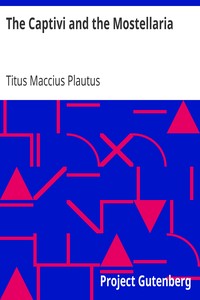The Captivi and the Mostellaria by Titus Maccius Plautus
"The Captivi and the Mostellaria" by Titus Maccius Plautus is a collection of two Roman plays that exemplifies the comedic aspects of ancient theater, likely written during the late 3rd century BC. The plays deal with themes such as mistaken identities, parental relationships, and the plight of captives, all while delivering humor through sharp dialogue and situational comedy. Key characters emerge: Hegio, the father desperate to rescue his son from captivity, and
the captives, Philocrates and Tyndarus, who find themselves in a web of deception and exchange. The opening of the first play, "The Captivi," introduces the entangled narrative surrounding Hegio and his sons—one lost to slavery and the other a captive. The prologue establishes the backstory, where Philocrates and Tyndarus plot to swap identities in an attempt to manipulate their respective situations. As they navigate the complex roles of slaves and masters, the humor shines through in their schemes and the misunderstandings that arise. The interactions reveal a mix of desperation and cleverness among characters, setting the stage for further comedic exploits and illustrating the folly inherent in human endeavors. (This is an automatically generated summary.)
Read or download for free
| How to read | Url | Size | |||
|---|---|---|---|---|---|
| Read now! | https://www.gutenberg.org/ebooks/7282.html.images | 315 kB | |||
| EPUB3 (E-readers incl. Send-to-Kindle) | https://www.gutenberg.org/ebooks/7282.epub3.images | 182 kB | |||
| EPUB (older E-readers) | https://www.gutenberg.org/ebooks/7282.epub.images | 185 kB | |||
| EPUB (no images, older E-readers) | https://www.gutenberg.org/ebooks/7282.epub.noimages | 177 kB | |||
| Kindle | https://www.gutenberg.org/ebooks/7282.kf8.images | 406 kB | |||
| older Kindles | https://www.gutenberg.org/ebooks/7282.kindle.images | 364 kB | |||
| Plain Text UTF-8 | https://www.gutenberg.org/ebooks/7282.txt.utf-8 | 252 kB | |||
| Download HTML (zip) | https://www.gutenberg.org/cache/epub/7282/pg7282-h.zip | 175 kB | |||
| There may be more files related to this item. | |||||
About this eBook
| Author | Plautus, Titus Maccius, 255 BCE-185 BCE |
|---|---|
| Translator | Riley, Henry T. (Henry Thomas), 1816-1878 |
| Title | The Captivi and the Mostellaria |
| Credits |
Text file produced by David Starner, Blain Nelson, Ted Garvin and the Online Distributed Proofreading Team HTML file produced by David Widger |
| Reading Level | Reading ease score: 82.3 (6th grade). Easy to read. |
| Language | English |
| LoC Class | PA: Language and Literatures: Classical Languages and Literature |
| Subject | Latin drama (Comedy) |
| Subject | Plautus, Titus Maccius -- Translations into English |
| Category | Text |
| EBook-No. | 7282 |
| Release Date | Jan 1, 2005 |
| Most Recently Updated | May 15, 2013 |
| Copyright Status | Public domain in the USA. |
| Downloads | 578 downloads in the last 30 days. |
| Project Gutenberg eBooks are always free! | |

